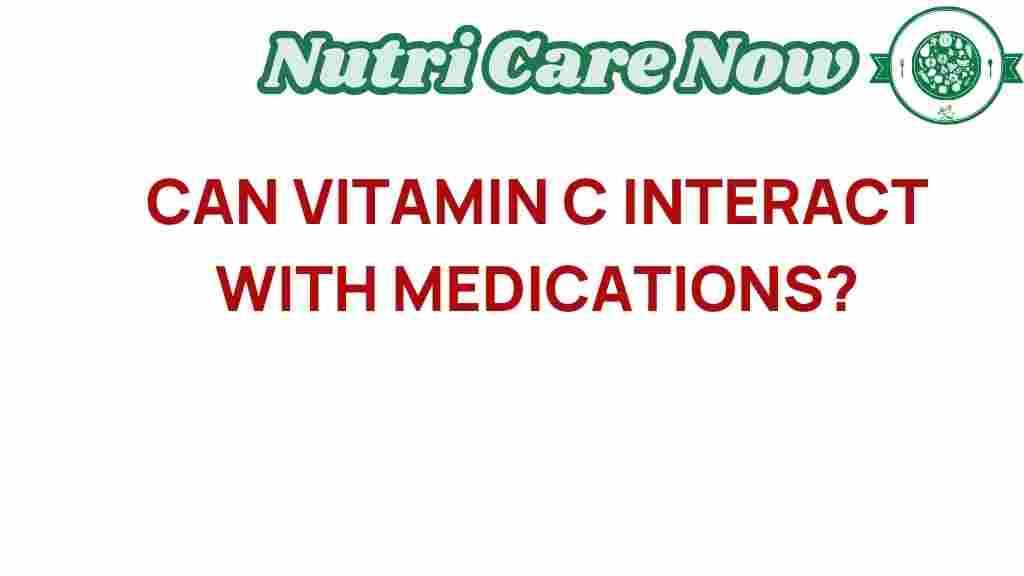The Surprising Truth: Can Vitamin C Interact with Your Medications?
Vitamin C, known scientifically as ascorbic acid, is a vital nutrient that plays an essential role in various bodily functions. It is renowned for its immune support properties and its ability to act as a powerful antioxidant. While many people take Vitamin C supplements to boost their health and overall wellness, a common question arises: Can Vitamin C interact with your medications? In this article, we will explore the interactions between Vitamin C and medications, how these interactions can affect your health, and what you need to know to ensure your safety.
Understanding Vitamin C and Its Benefits
Vitamin C is a water-soluble vitamin that is critical for maintaining the health of skin, blood vessels, bones, and cartilage. It also aids in the healing of wounds. Some of the key benefits of Vitamin C include:
- Immune Support: Vitamin C enhances the function of immune cells, helping your body fend off infections.
- Antioxidant Protection: It neutralizes free radicals, protecting cells from damage.
- Collagen Production: Vitamin C is essential for the synthesis of collagen, a protein that helps keep skin and joints healthy.
- Improved Iron Absorption: It enhances the absorption of non-heme iron from plant sources.
With such significant benefits, it’s no wonder many individuals incorporate Vitamin C supplements into their daily routines. However, understanding the potential interactions with medications is crucial for ensuring your health and safety.
How Vitamin C Can Interact with Medications
Vitamin C can interact with various medications, affecting their efficacy and safety. Here are some key areas where interactions may occur:
- Antioxidant Interactions: High doses of Vitamin C may reduce the effectiveness of certain chemotherapy drugs by neutralizing their oxidative effects.
- Antibiotics: Some studies suggest that Vitamin C may enhance the effectiveness of antibiotics, but it can also potentially interfere with the absorption of certain types, like tetracyclines.
- Blood Thinners: Vitamin C may affect the metabolism of anticoagulants, like warfarin, which could impact blood clotting.
- Statins: Some evidence suggests that taking high doses of Vitamin C with statins may reduce the effectiveness of cholesterol-lowering medications.
Given these interactions, it’s essential to consider your medication regimen when taking Vitamin C supplements.
Step-by-Step Guide on Managing Vitamin C Intake with Medications
If you’re considering taking Vitamin C supplements or are currently taking them, follow these steps to manage your intake safely:
- Consult Your Healthcare Provider: Before starting any new supplement, including Vitamin C, discuss it with your doctor, especially if you are on medication.
- Review Your Medications: Make a list of all medications you are currently taking. This will help your healthcare provider identify any potential interactions.
- Monitor Dosage: If approved by your healthcare provider, stick to recommended dosages. High doses of Vitamin C (over 2000 mg per day) are more likely to cause interactions.
- Be Aware of Symptoms: Keep an eye out for any adverse symptoms, such as unusual bruising, bleeding, or gastrointestinal issues, which may indicate a negative interaction.
- Stay Informed: Regularly update yourself on the latest research regarding Vitamin C and its interactions with medications.
Common Medications That May Interact with Vitamin C
Here is a list of some common medications that may interact with Vitamin C:
- Warfarin (Coumadin): Vitamin C can affect how this blood thinner works.
- Tetracycline antibiotics: May have reduced absorption when taken with Vitamin C.
- Chemotherapy agents: Such as doxorubicin and cyclophosphamide, may have altered effectiveness.
- Statins: Drugs like atorvastatin and simvastatin may be less effective with high doses of Vitamin C.
Always consult with your healthcare provider for personalized advice regarding your specific medications and health conditions.
Troubleshooting Tips for Vitamin C and Medication Interactions
If you are experiencing issues or are concerned about potential interactions, consider these troubleshooting tips:
- Timing of Supplements: Take Vitamin C at a different time than your medications to minimize interactions.
- Adjust Dosage: If you experience side effects, discuss adjusting your Vitamin C dosage with your healthcare provider.
- Stay Hydrated: Ensure you drink plenty of water, which can help in the metabolism of both medications and vitamins.
- Dietary Sources Over Supplements: Whenever possible, aim to get Vitamin C from your diet rather than supplements. Foods rich in Vitamin C include oranges, strawberries, bell peppers, and broccoli.
Conclusion
Vitamin C is undoubtedly a powerful ally in promoting overall health, supporting the immune system, and contributing to various bodily functions. However, it is crucial to acknowledge that Vitamin C can interact with certain medications, potentially affecting their efficacy and safety. By consulting with your healthcare provider, monitoring your dosages, and being aware of the medications you are taking, you can safely incorporate Vitamin C into your health regimen.
For more information on nutrition and supplements, visit this resource. If you’re interested in learning about the safety of vitamins and supplements, check out this article.
Your health is a priority, and understanding the surprising truth about Vitamin C interactions with medications is key to maintaining it. Always stay informed and proactive in managing your health!
This article is in the category Supplements and created by NutriCareNow Team
